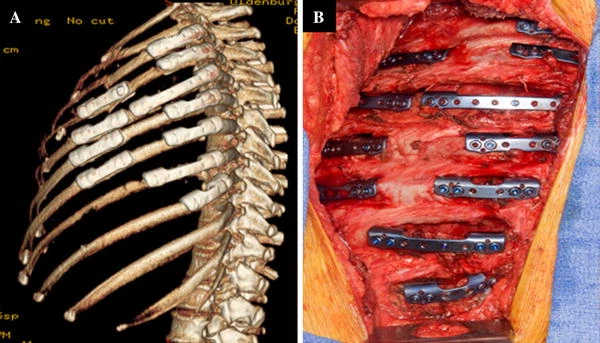Dr. Shilpa Gandhi | Leading Consultant Minimally Invasive Thoracic Surgeon In Nagpur
Meet Our Doctor
Dr. Shilpa Gandhi
MBBS, DNB General Surgery DNB Thoracic Surgery
Dr. Shilpa Gandhi is a trusted and experienced healthcare professional known for her compassionate care and expertise. Committed to delivering personalized treatments and improving patient well-being.


Surgery For Flail Chest In Bhandara
Flail chest is a serious medical condition that occurs when a segment of a rib cage becomes detached from rest of chest wall due to multiple rib fractures. This injury can severely affect lung function, breathing, and overall health. While mild cases may be managed with supportive care, surgery for flail chest may be necessary in more severe instances to prevent complications and ensure proper healing.
It is a life-threatening condition that can result from severe trauma, such as car accidents, falls, or other blunt force injuries. Occurs when a segment of the rib cage fractures in multiple places, causing a part of the chest wall to detach and move independently of the rest of the rib cage. This abnormal movement, known as paradoxical motion, can severely impair breathing and compromise lung function. Surgery for flail chest is often necessary to stabilize the chest, restore proper lung mechanics, and prevent long-term complications.
What is Flail Chest?
Flail chest occurs when three or more consecutive ribs are fractured in two or more places, causing segment of the rib cage to become detached. This “flail” segment moves independently from rest of the chest during breathing, leading a condition known as paradoxical movement. It can make it difficult to breathe properly, may lead to life-threatening complications like lung collapse, difficulty ventilating, and impaired oxygenation. Often caused by severe trauma, such as car accidents, falls, blunt force injuries. The severity of injury can vary depending on the number of ribs affected or the extent of the damage.
When Is Surgery for Flail Chest Recommended?
Surgery is not always necessary for flail chest. Mild cases can often be managed with non-surgical treatments like pain management, mechanical ventilation, and respiratory therapy. However, surgery for flail chest may be required in the following circumstances:
- Severe Pain: When pain from the rib fractures is unmanageable with medications and hampers breathing or movement.
- Respiratory Distress: If the flail chest causes significant difficulty in breathing or leads to a collapse of the lung (pneumothorax).
- Instability of the Chest Wall: In cases where the rib fractures prevent the chest from expanding and contracting normally, leading to complications like hypoxia (low oxygen levels).
- Risk of Pneumonia: Flail chest can lead to poor lung expansion, which increases the risk of developing pneumonia. Surgery may be recommended to help stabilize the chest and facilitate proper lung function.
Types of Surgery for Flail Chest
Open Reduction and Internal Fixation (ORIF) The most common surgical treatment for flail chest is Open Reduction and Internal Fixation (ORIF). This procedure involves making an incision to access the fractured ribs, realigning them, and then securing them in place using metal plates, screws, or wires. The goal is to stabilize the chest wall, restore normal breathing mechanics, and prevent further damage to the lungs.
Benefits of ORIF:
- Helps stabilize the chest wall, improving lung function and making breathing easier.
- Reduces pain and discomfort, allowing for more effective rehabilitation.
- Accelerates recovery and reduces the risk of complications such as pneumonia.
Risks of ORIF:
- Infection at the surgical site.
- Nerve damage, especially if the surgery is near the ribs.
- Long-term scarring or discomfort in some cases.
Thoracotomy with Rib Fixation In more severe cases of flail chest, a thoracotomy with rib fixation may be performed. This is a more invasive procedure that involves making a larger incision along the side of the chest to access the ribs and lungs. During this surgery, the surgeon may remove damaged tissue, drain any blood or fluid from the chest cavity, and then secure the ribs in place using fixation devices.
Benefits of Thoracotomy:
- Effective in cases where the flail chest is extensive or involves multiple rib fractures.
- Offers the ability to treat both the chest wall instability and any internal injuries, such as lung contusions.
Risks of Thoracotomy:
- Increased risk of complications, including infection and damage to surrounding organs.
- Longer recovery time due to the larger incision and more invasive procedure.
Minimally Invasive Rib Stabilization In some cases, minimally invasive rib stabilization techniques are used to treat flail chest. These procedures involve smaller incisions and the use of specialized instruments to stabilize the rib fractures without the need for a large open incision. Minimally invasive techniques can reduce the risk of infection and shorten recovery times, though they may not be suitable for all cases.
Benefits of Minimally Invasive Stabilization:
- Reduced risk of infection or faster recovery times compared to traditional open surgery.
- Less scarring and trauma to surrounding tissues.
Risks of Minimally Invasive Stabilization:
- Not as effective in very severe cases with multiple fractures.
- Requires highly specialized skills and equipment.
What to Expect Before, During, and After Surgery for Flail Chest
Before Surgery:
- A thorough evaluation will be performed, including imaging tests such as X-rays or CT scans to assess the extent of the rib fractures and any internal injuries.
- The medical team will assess your overall health to ensure you are fit for surgery. You may need to stop taking certain medications and follow specific pre-operative instructions.
During Surgery:
- Depending on the severity of the flail chest and the surgical approach, the procedure may be performed under general anesthesia.
- For ORIF, the surgeon will make small incisions to access the fractured ribs and secure them with plates or screws.
- In more severe cases, such as a thoracotomy, a larger incision will be made to treat the chest wall instability and any lung damage.
After Surgery:
- Recovery times vary depending on the surgical approach and the severity of the injury. Most patients will spend several days to weeks in the hospital, particularly if mechanical ventilation or intensive care is required.
- Pain management, respiratory therapy, and physical therapy will be important aspects of your recovery.
- Follow-up appointments will be scheduled to monitor healing and ensure proper rib fixation and lung function.
Benefits of Surgery for Flail Chest
- Improved Breathing: Surgery helps stabilize the chest wall, allowing for better lung expansion and easier breathing.
- Reduced Pain: Rib fixation or stabilization reduces the pain associated with flail chest, making it easier to breathe and recover.
- Faster Recovery: Stabilizing the rib cage accelerates healing and can reduce the risk of complications such as pneumonia or further lung collapse.
- Prevention of Long-Term Complications: Proper rib fixation prevents long-term chest wall instability, which can lead to chronic pain and respiratory issues.
Risks of Surgery for Flail Chest
- Infection: Like any surgery, there is the risk of infection at the incision sites.
- Bleeding: Surgery may cause bleeding, particularly in patients with extensive trauma or underlying conditions.
- Scarring and Pain: Depending on the surgical approach, there may be long-term scarring or discomfort in the chest area.
- Organ Damage: Although rare, there is a risk of injury to surrounding organs, such as the lungs, heart, or blood vessels.Contact Us
Conclusion
Treating severe rib fractures that impair normal breathing and lung function often requires surgery for flail chest. Surgeons stabilize the chest wall, reduce pain, and promote recovery using methods such as open reduction and internal fixation (ORIF), thoracotomy, or minimally invasive rib stabilization.
If you or a loved one is dealing with flail chest, consult a skilled thoracic surgeon who will recommend the most appropriate surgical treatment based on the injury’s severity. With the right care and surgical intervention, patients can recover and regain normal breathing and quality of life. Book an appointment with Dr. Shilpa Gandhi for specialized thoracic care.



